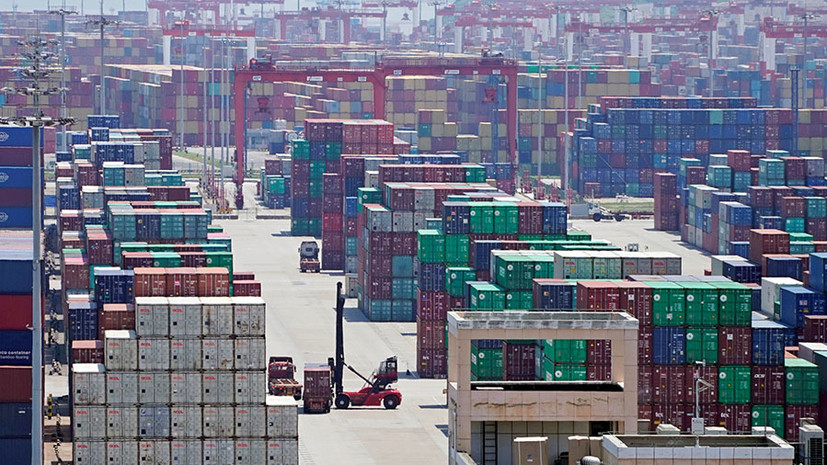From April to June 2020, global trade may fall by 18.5% compared to the same period in 2019. The collapse of the indicator risks becoming the largest for the entire time of observation. This is stated in the report of the World Trade Organization (WTO).
"The observed reduction in trade volumes reaches unprecedented mastaba - in fact, it will be the sharpest in history," said WTO Director General Robert Azevedo.
According to a preliminary assessment of the organization, according to the results of 2020, world trade turnover will be able to decrease by 13–32%. According to experts, in the spring against the backdrop of the coronavirus pandemic, most countries of the world were forced to suspend the work of a number of industries, as well as blocked ground and air borders. The situation led to a virtual halt in global trade, said Alexander Razuvaev, head of the Alpari information and analytical center.
“In addition, a huge trade downturn occurred due to a significant reduction in global demand. In the isolation mode, while sitting at home, consumers spent little, and now, with the removal of quarantine, consumer activity is only beginning to recover. At the same time, the fears of many authorities about the emergence of the second wave of coronavirus are holding back the positive effect of lifting the restrictions, ”Razuvaev explained in a conversation with RT.
In the current environment, it may take four to eight months to resume global trade growth. This point of view in an interview with RT was expressed by the investment strategist of BCS Premier Alexander Bakhtin.
According to analysts, the most noticeable decline in world trade and the massive closure of production can affect large developed countries. At the same time, the USA and the EU risk the most serious losses. According to the World Bank forecast, in 2020 the United States' GDP will decrease by 6.1%, and the eurozone - by 9.1%.
“The most vulnerable countries may be those whose economies are heavily dependent on global trade, the provision of services and financial flows. First of all, we are talking about the USA and Europe. Today, the States occupy about 15.1% of global GDP, and the eurozone - about 11%. Thus, the collapse of trade and demand both in the economy and in the international arena immediately hits them, ”said TeleTrade chief analyst Mark Goichmann.
Moreover, an additional blow to international trade relations could be inflicted by a possible aggravation of relations between the United States and China. Recall that in January 2020, Washington and Beijing agreed to end the tariff war and signed the corresponding agreement. Meanwhile, on June 23, White House adviser to Peter White, Navarro, on Fox News, said Trump had allegedly decided to break the deal with China. Later, the head of the White House denied reports of the termination of the trade transaction, but experts do not rule out another surge in tension between the countries.
“A new round of the trade war between Washington and Beijing can only aggravate the situation for the US economy. At the same time, we see that Trump has recently repeatedly demonstrated negative rhetoric, accusing the PRC of allegedly untimely reporting of the appearance of COVID-19. China, however, did not remain in debt and has already deliberately depreciated the renminbi, making its goods more attractive to exporters, ”said Alexander Razuvaev.
It is noteworthy that significant costs may be incurred by Japan, whose economy is mainly tied to the sale of goods and services abroad. Such an opinion in an interview with RT was expressed by the analyst of the Finam group of companies, Alexei Korenev. According to the Ministry of Finance, in May, Japanese exports fell immediately by 28.3%. The rate of decline has peaked in more than ten years.
“The Japanese economy is almost completely focused on the processing of raw materials and their further re-export, since the country does not have its own resources. Against the background of border closures and a decline in consumer demand due to the pandemic, the Japanese lost their market. The automotive and industrial sectors were hit hardest. The record size of the country's national debt, which left Japan without a financial safety cushion, also played a role, ”Korenev explained.
According to experts, to some extent, the collapse of world trade can affect Russia. However, according to Alexander Razuvaev, the country is less and less exposed to the negative effect due to the emerging recovery in oil prices. Since the beginning of June, the raw materials of the Brent benchmark on the ICE exchange in London have risen in price by more than 12% - to $ 42-43.
“Oil quotes have already reached a comfortable level for most exporters, including Russia. This suggests that the Russian economy will be able to avoid a long recession following the results of 2020, ”the expert concluded.

